The Caribbean leads the way towards early warnings for all
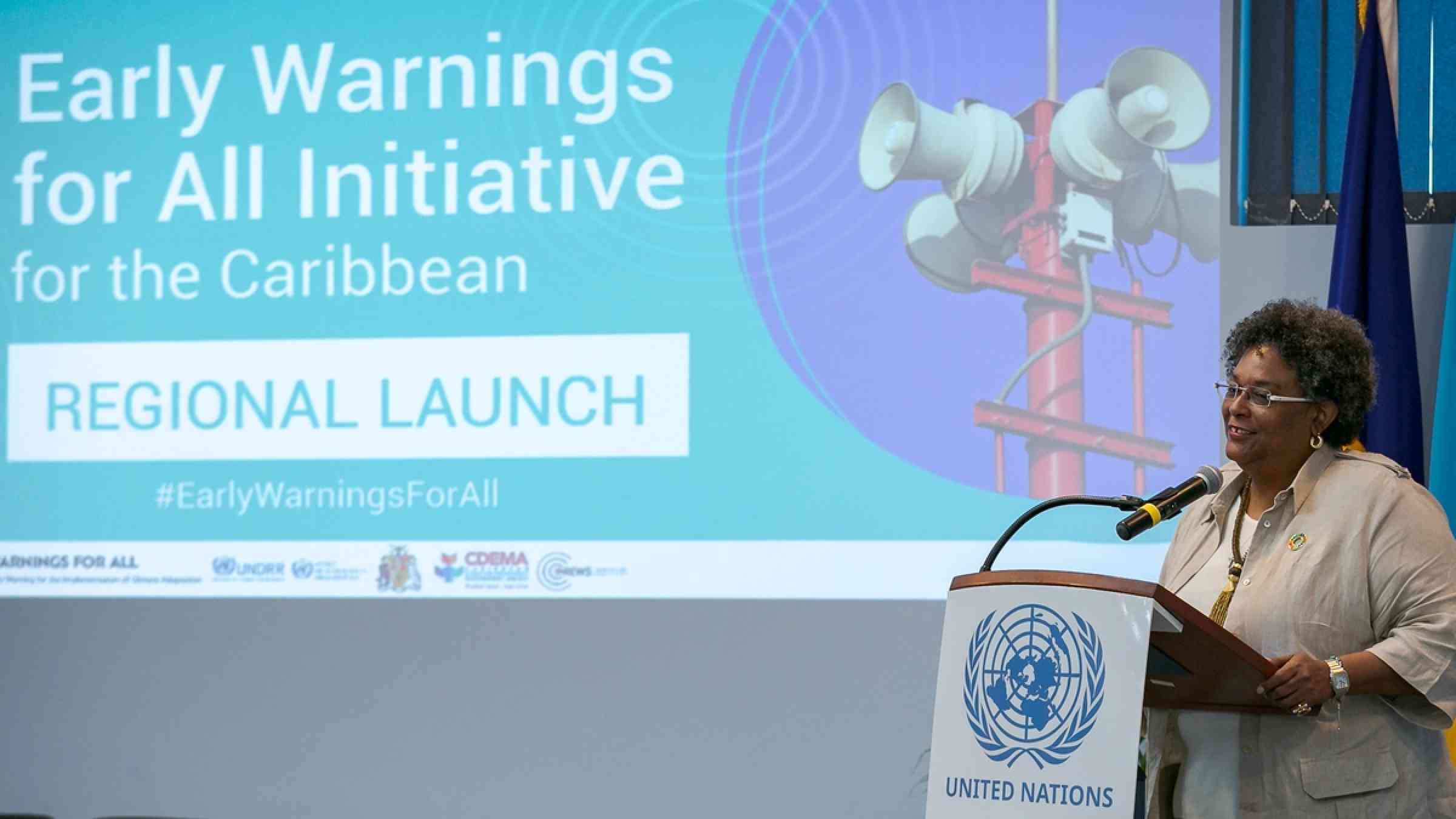
6 February 2023: Bridgetown, Barbados.
“Disasters remind us that we are world citizens, whether we like it or not.”
The world’s first regional launch of the Early Warnings For All Initiative has taken place in Barbados led by Prime Minister Mia Amor Mottley, who spoke with conviction about the disasters faced by her region and by nations around the world.
In October 2022, when UN Secretary-General António Guterres launched The Executive Action Plan for the Early Warnings for All at COP27, he called on the World Meteorological Organisation (WMO) and the UN Office for Disaster Risk Reduction (UNDRR) to co-lead the initiative and implement it in collaboration with a wide range of global partners – with a timeline that would see universal coverage within five years.
This plan calls for partnerships drawing together all sectors, at local, regional and international levels.
Prime Minister Mottley pointed out that when disasters hit, they strike across national boundaries – and our preparations and responses need be united.
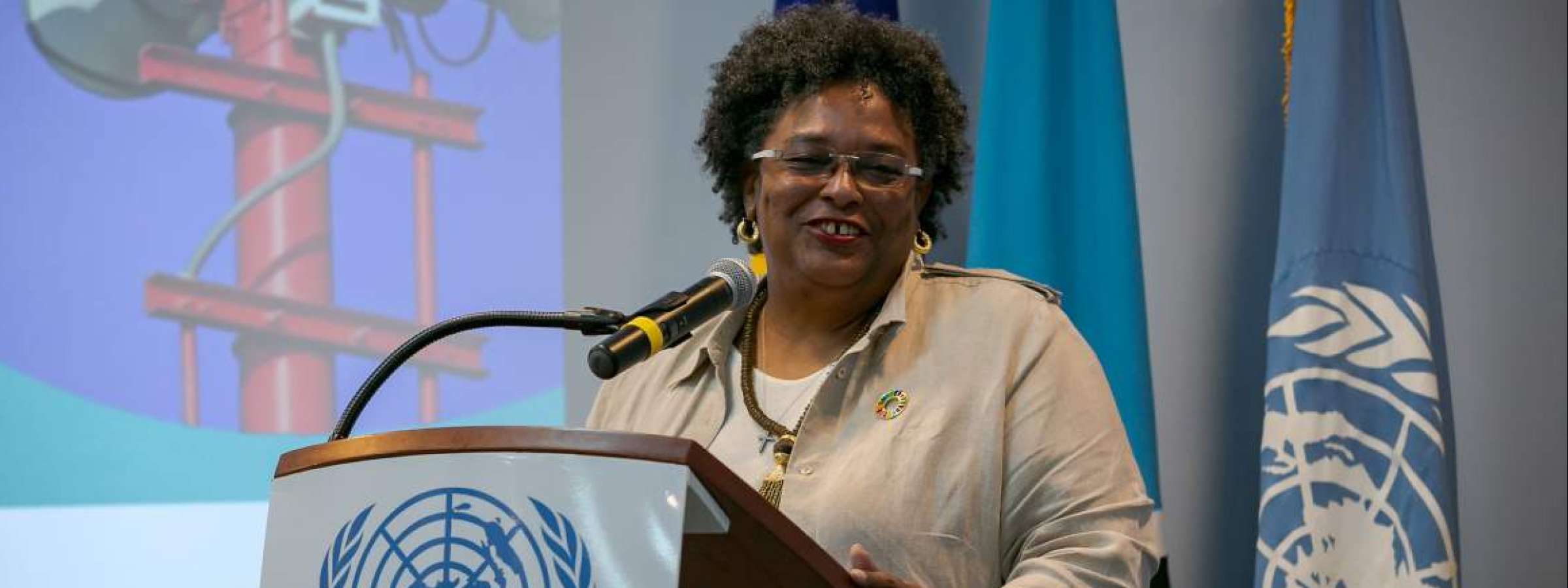
Mia Amor Mottley
“The greatest global challenge”
“It is only when we are united in partnership and we remove the divisions that have been foisted upon us by history, or by law, or whatever, that we can come together to fight what is the greatest global challenge ever since human civilisation began,” Ms. Mottley said.
“We have to change how we think and act in this world if these actions are going to make difference to the lives of so many,” she stated.
Emphasis on the safety of people
Philip J. Pierre, Prime Minister of Saint Lucia, noted that the region is especially prone to complex and cascading hazards.
“Hurricanes visit our shores regularly, causing extensive damage to infrastructure, and sometimes wiping out nearly the entire GDP of our countries in loss and damage within hours,” he said.
The 2017 hurricane season, with almost US$300 billion of damages, was the costliest season on record.
Not a privilege, but a right
In a recorded video message, UN Deputy Secretary-General Amina Mohammed explained that the Secretary-General’s initiative to extend multi-hazard early warning systems to cover all people would require an investment of US$3.1 billion, but its benefits would be immense, saving countless lives and protecting economies.
“Every person in the Caribbean, in Small Island Developing States, and the world, must be protected by an effective, multi-hazard early warning system,” Ms Mohammed said.
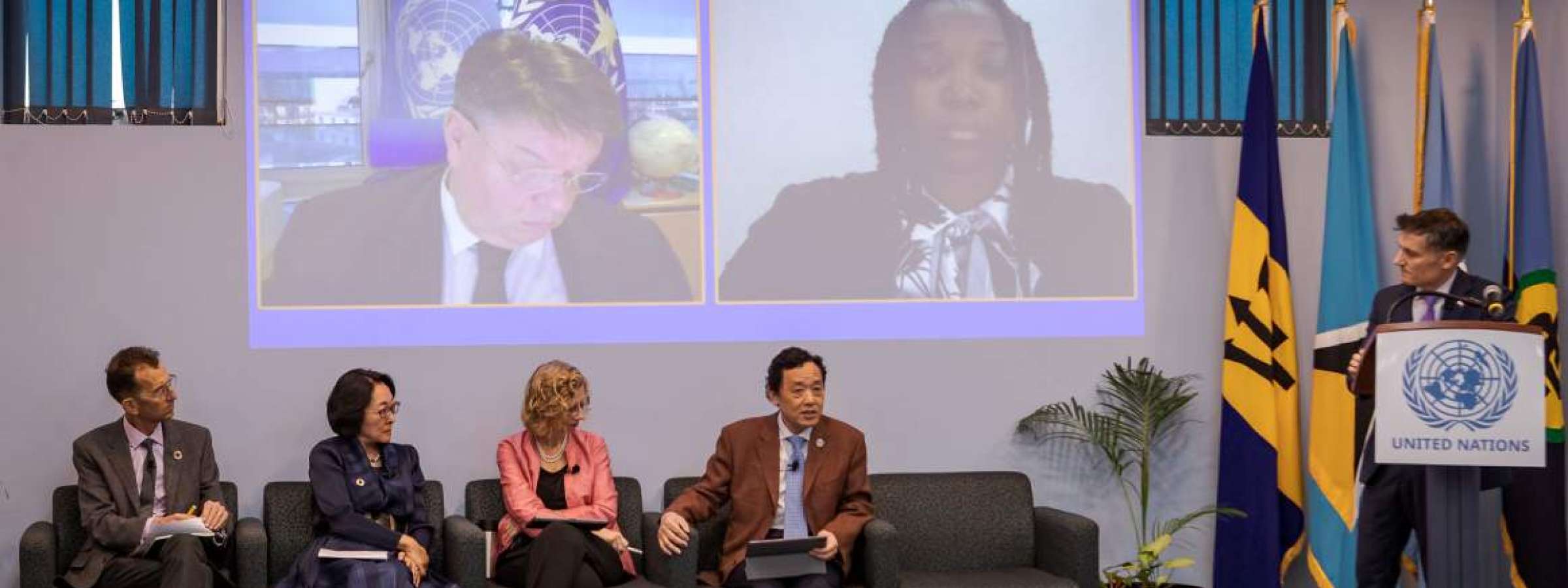
Panel discussion with Gerard Howe, Mami Mizutori, Inger Andersen and Qu Dongyu, with Petteri Taalas and Shajunee Gumbs via video link, moderated by UN Resident Coordinator Didier Trebucq
Ensure that no-one is left behind
UN Resident Coordinator Didier Trebucq introduced the panel discussion including the heads of four UN agencies along with the chair of the Climate Risk and Early Warning Systems (CREWS) Initiative and the Youth Ambassador of St. Kitts and Nevis.
He noted advances in his region’s preparedness for natural hazards, as well as some challenges.
“In the Caribbean, early warning systems have progressed, with roadmaps completed in seven of the CDEMA (the Caribbean Disaster Emergency Management Agency) participating states,” Mr Trebucq said.
However, gaps remain in building ‘last mile’ coverage, to ensure that no-one is left behind.
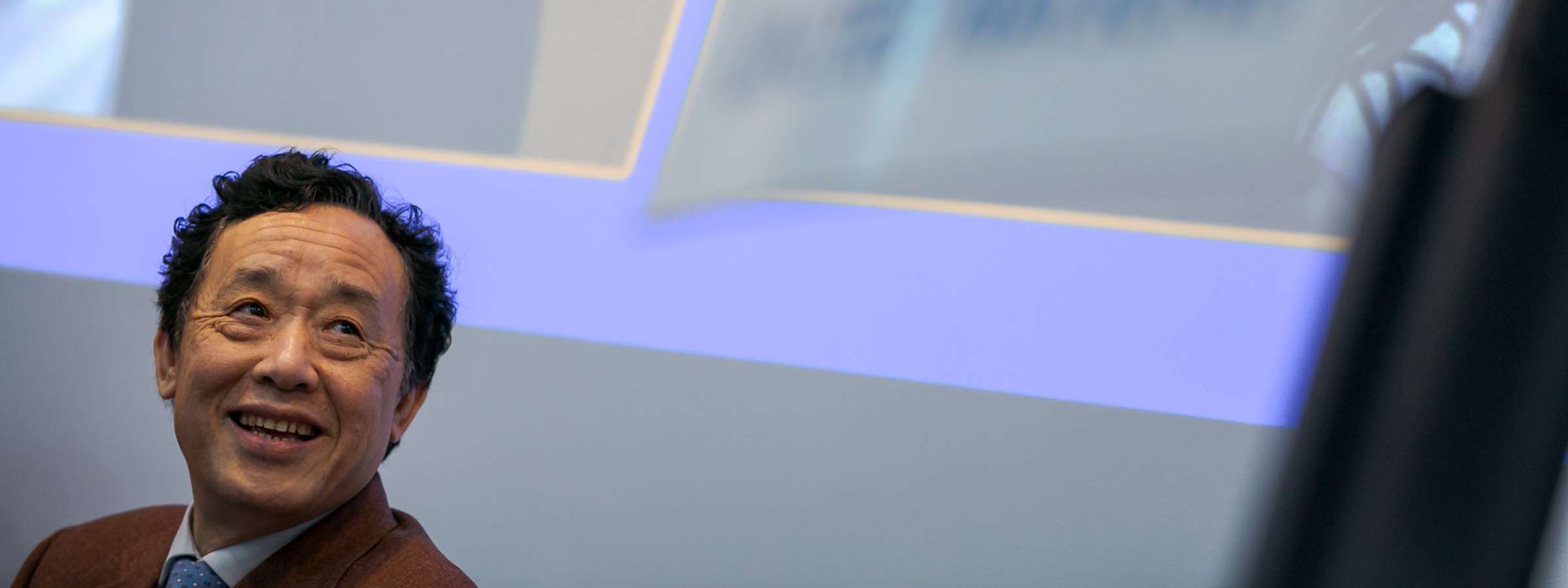
Qu Dongyu
Food security for the least developed countries
Mr. Qu Dongyu, Director General of the Food and Agriculture Organization (FAO), said that FAO is working with UN partners to establish early warning systems to protect agri-food systems against hazards.
“We’ve also established offices for the small island developing states (SIDS) and least developed countries (LDCs), with special attention to the SIDS, who face challenges from the three Cs – climate crisis, Covid-19 and conflict,” he said.
Improving predictive capacity
Joining via video link, the Secretary-General of WMO, Prof Petteri Taalas, noted that early warning systems rely on our capacity to monitor and predict changes in the weather and climate, and that the science was making important gains.
“At the moment we are not able to describe these weather extremes or the water cycle in an accurate way – our dream is to have the biggest possible supercomputer facilities to estimate what kind of risks we are going to face in the future.”
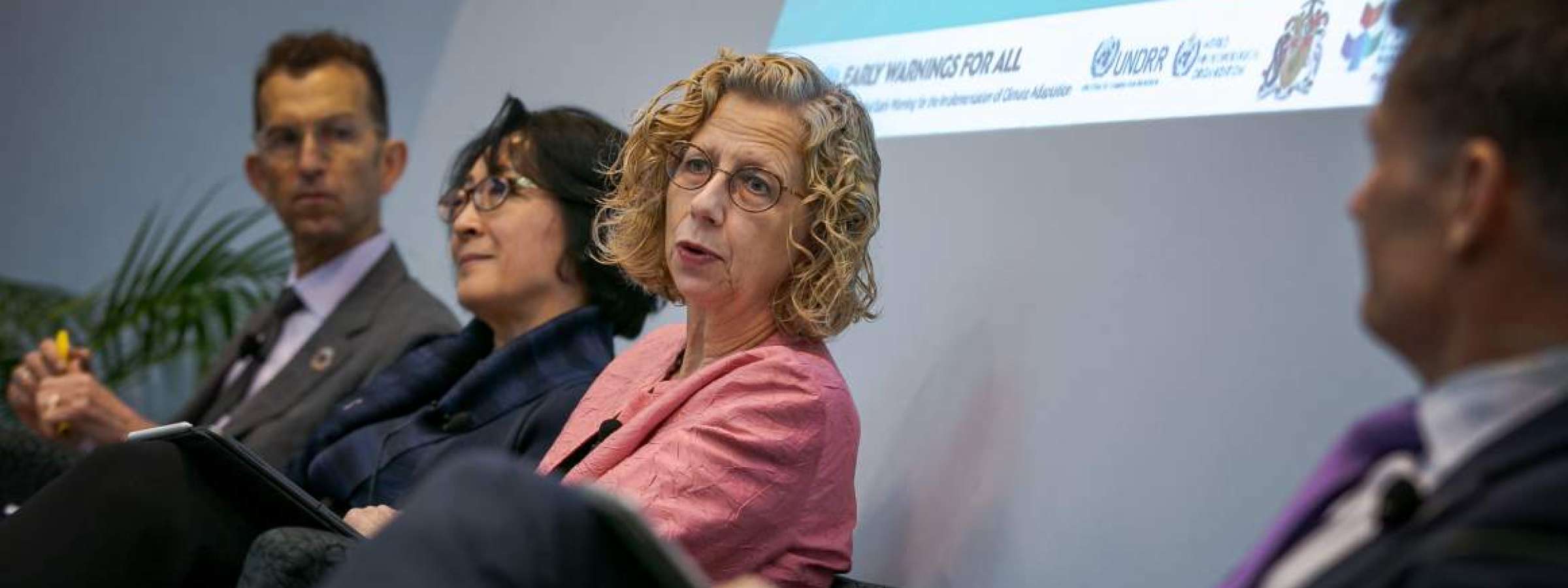
Inger Andersen
We must protect nature, so that nature can protect us
Ms. Inger Andersen, Executive Director of the UN Environment Programme (UNEP), spoke of the importance of investing in resilience, using nature-based solutions, alongside investment in early warning systems.
“We from UNEP very much feel that the work of our colleagues at UNDRR, the work of our colleagues at WMO, is important; because getting early warning means that you can begin to prepare, means that in your investments you can create resilience,” she said.
Actions must be owned by regional and national instructions
Ambassador Gerard Howe, chair of the CREWS Initiative, said that they are working with key regional partners on several important programmes including a strategic road map for enhancing multi hazard early warning systems, national-level flood strategies, and work on inclusion and capacity building.
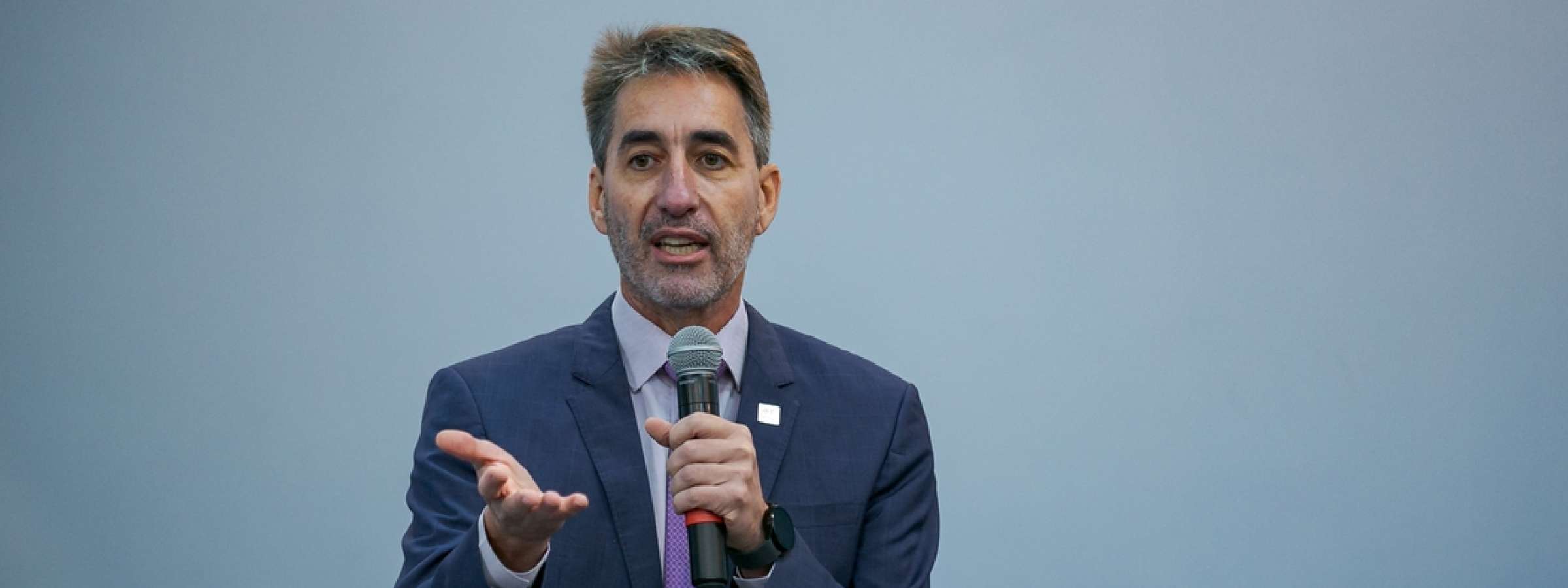
Ariel Kestens
Early warnings must trigger early actions to save lives
Ariel Kestens, Head of the Country Cluster Support Team for the Anglo Caribbean at the International Federation of Red Cross and Red Crescent Societies (IFRC), also stressed the importance of local community engagement in developing and implementing early warning systems.
“Early warnings are only positive when they can turn into early actions which are able to save lives,” he argued.
“We in the IFRC strongly believe in building preparedness and capacities that are risk-informed and impact-based at local level,” Mr Kestens said.
Inclusion means bringing the youth on board
Ms. Shajunee Gumbs, Youth Ambassador of St Kitts and Nevis, reminded the assembled leaders that the emerging generation needs a seat at the table.
“As a youth, I must say that the most important aspect is to ensure that we have the youth involved in dissemination and communication, and response capability,” she stated.
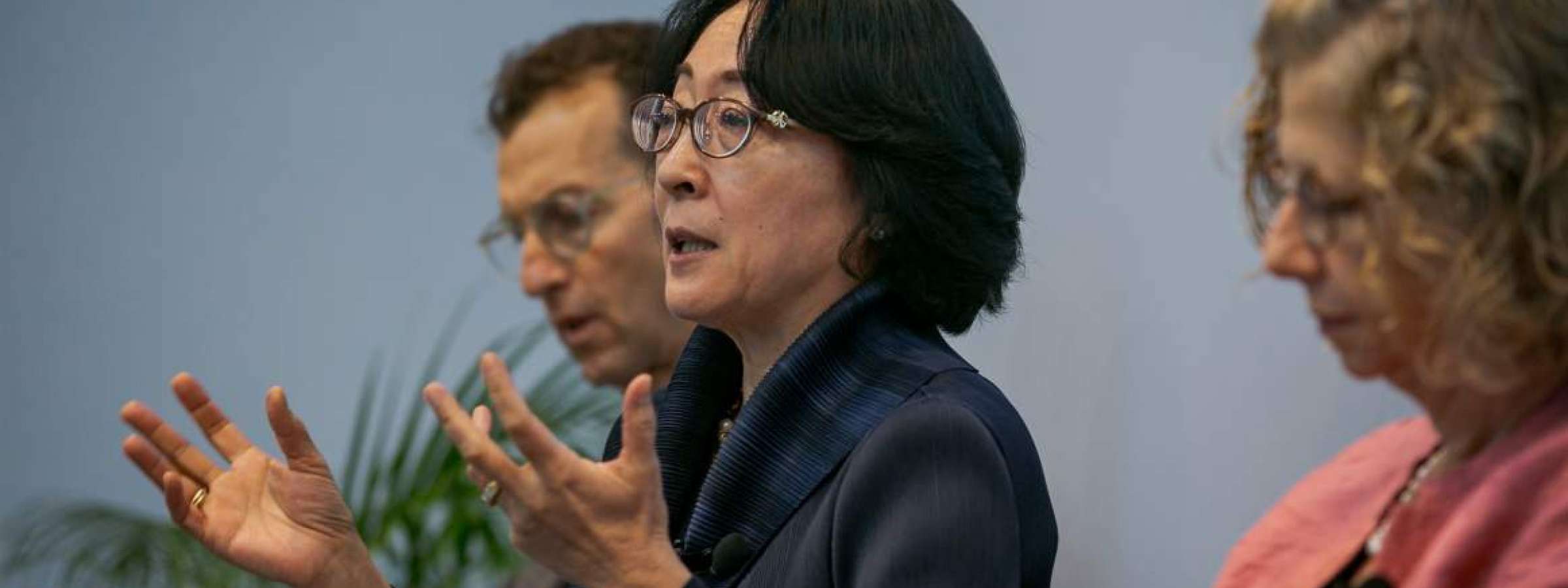
Mami Mizutori
Political will is the key to success
UNDRR Head Mami Mizutori said that the launch marks “a critical first step toward coalescing the national, regional, and global cooperation needed to ensure everyone on Earth, especially the most vulnerable populations, are protected by multi-hazard early warning systems.”
In order to make real progress, the initiative needs to be taken up by leaders at all levels.
“Most important is the political will at the national and community level. We have seen it today demonstrated by the Prime Ministers of Barbados and Saint Lucia, and from the Secretary General of CARICOM,” Ms Mizutori said.
All photos: UNDRR/Antoine Tardy